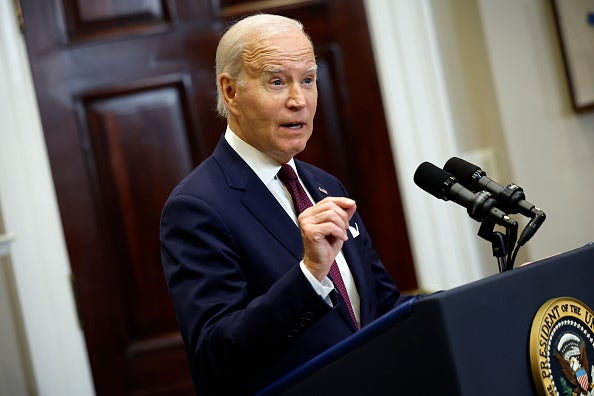Why Biden won’t really stand up to the Supreme Court
Despite the setbacks, Mr Biden has resisted calls to expand the court beyond the normal nine members


The end of June also signals the end of the 2022-2023 session of the Supreme Court, and the second one since the 6-3 conservative majority took over the highest court. In response to the Supreme Court overturning affirmative for race-based admissions in higher education, President Joe Biden has said the court has run amok, saying “This is not a normal court.”
On Friday, the court offered another blow to Mr Biden when it overturned his student loan forgiveness policy, which prompted the president to say “the court’s decision ... is wrong.”
Despite the setbacks, Mr Biden has resisted calls to expand the court beyond the normal nine members, much to the chagrin of progressives. In the lead-up to the 2020 Democratic primary, many progressives had floated the idea of expanding the number of justices in response to the conservative takeover of the highest court in the land.
This idea became especially en vogue with many left-wing voters after the then-Senate Majority Leader Mitch McConnell blocked Barack Obama’s Supreme Court nominee Merrick Garland from even getting a hearing or a vote. Incidentally, some progressives like Sen Bernie Sanders (I-VT) did not support it in the 2020 primary, whereas Pete Buttigieg, Sen Amy Klobuchar (D-MN) and even Mr Biden’s future running-mate Kamala Harris expressed at least an openness to expanding the number of justices.
The clarion calls to grow the court got even louder after Mr McConnell and Donald Trump rammed through the confirmation of Justice Amy Coney Barrett just weeks before the 2020 presidential election after the death of Ruth Bader Ginsburg, despite the fact Mr McConnell blocked Mr Garland’s nomination on the premise that a justice shouldn’t be confirmed during a presidential election year. Since then, his 2020 Democratic opponent Sen Elizabeth Warren has come out in support of expanding the court.
But Mr Biden has rejected such overtures. When he was asked about it in the first 2020 presidential debate against Mr Trump, he said simply, “Whatever position I take on that, that’ll become the issue,” which prompted Mr Trump to keep interrupting him, leading to Mr Biden to famously exclaim “will you shut up, man?”
Since taking office, Mr Biden has not moved on the issue, even as he has evolved on allowing the removal of the filibuster to protect voting rights and codify abortion rights. To some, Mr Biden’s unwillingness to support packing the court may seem similar to his overall squeamishness when it comes to support for abortion rights. Even this week, he said “I’m a practising Catholic” and added “I’m not big on abortion, but guess what? Roe v Wade got it right.”
But Mr Biden’s unwillingness to move on abortion rights is more akin to his belief in not disrupting institutions writ large. As a senator for 36 years, Mr Biden worked frequently on judicial issues. When Justice Stephen Breyer announced his decision to leave the court, Mr Biden reminisced wistfully about how they knew each other on the Senate Judiciary Committee, which Mr Biden would eventually lead, where he famously helped torpedo the nomination of Robert Bork but also oversaw the confirmation of Mr Breyer, as well as the confirmation of Ms Ginsburg.
The flip side to this, though, is that at times, he has failed to see how politics and public sentiment have shifted. Many women may also note that his unwillingness to challenge the way business was conducted in Washington meant that he failed to take Anita Hill’s allegations of sexual misconduct by eventual Justice Clarence Thomas seriously.
Mr Biden largely ran and campaigned on the idea that most Americans were sick of Mr Trump’s continued shattering of norms. He frequently harkened back to his time as Mr Obama’s most faithful lieutenant. Most famously, when Ms Warren said she supported Mr Sanders’s health care plan, Mr Biden said, “I’m with Barack”.
For Mr Biden, supporting the expansion the court would be a betrayal of the promised return to normalcy that he pledged to the American public. But beyond that, there simply would not be enough votes in Congress to do so, given that the Constitution gives Congress the power to deal with the courts and the GOP currently controls the House. Similarly, any attempt would need to overcome a filibuster in the Senate, something unlikely to happen.
In the same vein, Mr Biden might think that public opinion is not fully on the side of expanding the court. Polling on expanding the court is scant and the surveys that do exist show only a slim majority support packing the court.
Mr Biden has shown a willingness to finally move with the rest of the Democratic Party at times, but only when he feels public opinion is firmly on his side, as was the case with his support for same-sex marriage. In the same way, he might not feel he would have the country on his side were he to do that. And for a president already in a precarious position for re-election, that might be too high a cost to pay.

Join our commenting forum
Join thought-provoking conversations, follow other Independent readers and see their replies